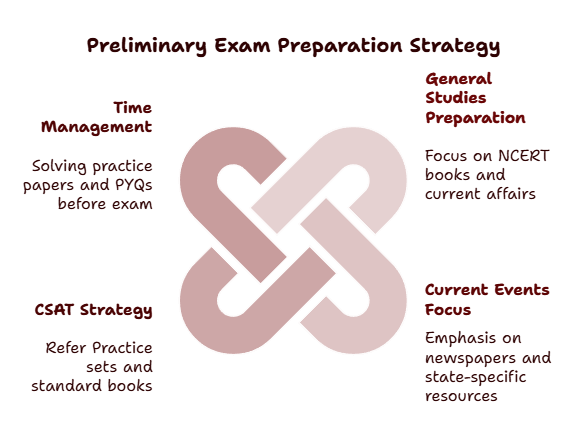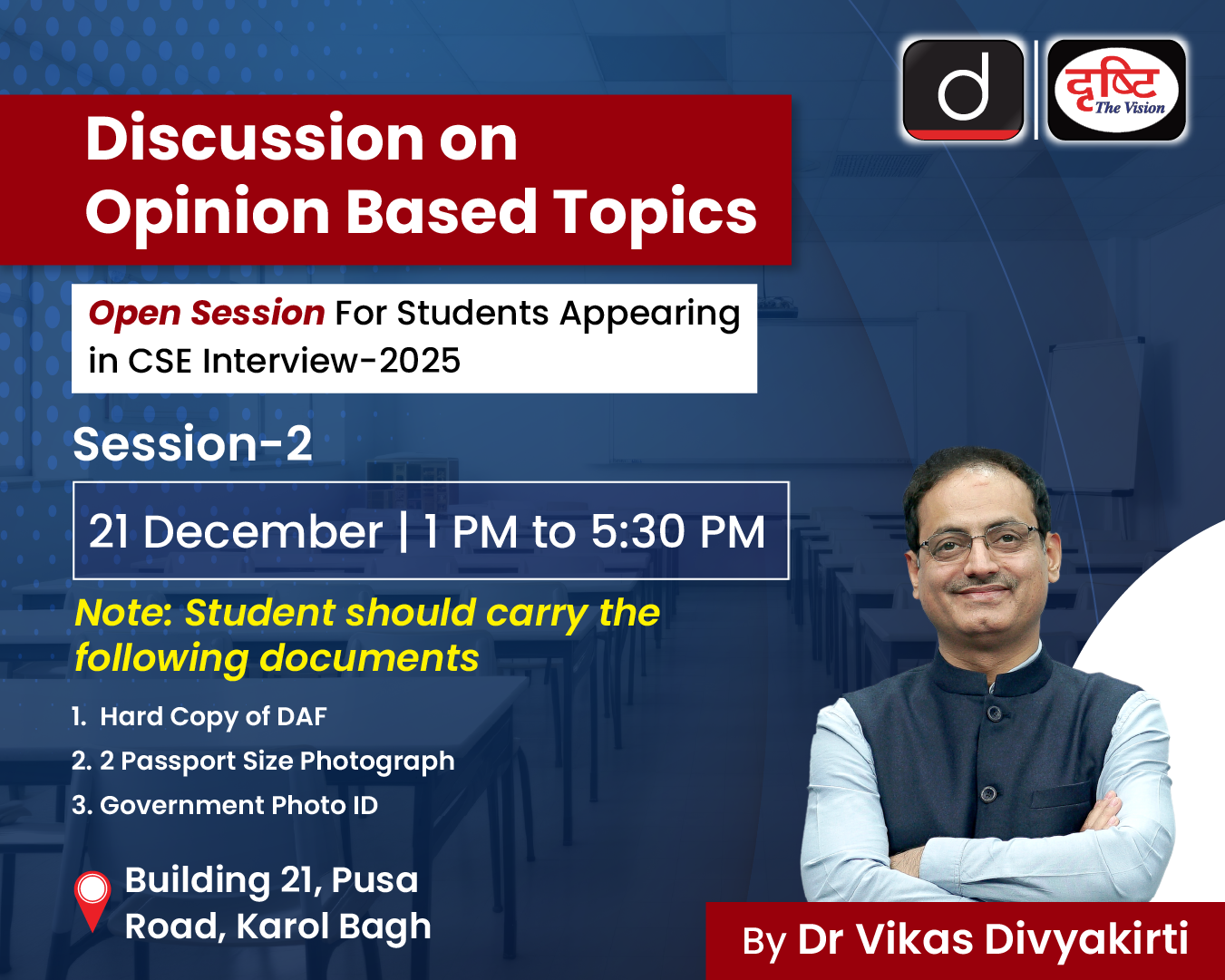Uttar Pradesh
Strategy for UPPCS Exam
- 06 Jan 2025
- 12 min read
What is the Need of Strategy for UPPCS Exam?
To achieve success in the Uttar Pradesh Combined State/Upper Subordinate Services (PCS) examination, it is essential to devise a proper and dynamic strategy tailored to the nature of the exam. This strategic approach serves as the foundation for your preparation, ensuring you are well-positioned for success from the very beginning.
- The UPPCS examination is conducted in three stages:
- Preliminary Examination (Objective Type)
- Main Examination (Conventional Type, i.e., Written Examination)
- Viva-Voce (Personality Test)
- Progressing to each subsequent stage requires success in the preceding one.
- Since the nature of these three stages varies significantly, it is crucial to adopt a unique and focused strategy for each stage to maximize the chances of success.
Preliminary Examination Strategy
- Thorough Review of Previous Year's Questions:
- Review the questions asked in the Preliminary Examination over the last 5 to 10 years.
- Pay close attention to recurring points and topics that have shown a consistent trend in question papers.
- Focus on Factual Accuracy:
- Since the nature of questions in the Preliminary Examination is objective type, special attention must be given to factual accuracy. Examples of such questions include:
- Who first read the inscription of Ashoka?
- Which river of India is known as the 'Ganga of the South'?
- Which hormone is known as 'Fight or Flight'?
- Since the nature of questions in the Preliminary Examination is objective type, special attention must be given to factual accuracy. Examples of such questions include:
- Tip to Improve Conceptual and Factual Knowledge:
- A micro-level observation of the syllabus and past questions highlights the need for a deep conceptual and factual understanding of key sections.
- Short Notes Preparation: The easiest way to remember and solve factual questions is to prepare short notes and review them regularly. For example:
- E.g. A question was asked about the concept of the 'concurrent list' in the Indian Constitution and its origin. Preparing a list of major concepts taken from different countries in the Indian Constitution can be helpful.
- Focus Areas in General Studies (Paper-I):
- The traditional questions in General Studies cover topics such as:
- History of India and Indian National Movement
- India and World Geography
- Indian Polity and Governance
- Economic and Social Development
- Environment and Ecology
- General Science
- To prepare for these topics:
- Study NCERT books from Class 6 to Class 12 for each subject.
- Refer to the monthly magazine Drishti Current Affairs Today and its special issue sections.
- The traditional questions in General Studies cover topics such as:
- Current Events and State-Specific Questions:
- Current Events: Given the increasing weightage of current events, regularly study daily newspapers such as The Hindu and Indian Express.
- Supplement this with resources available on the Drishti website and Drishti Current Affairs Today.
- State-Specific Questions: For state-specific questions, study resources like the book Uttar Pradesh published by the Publications Department of the Government of Uttar Pradesh or other standard state-level books available in the market.
- Reference for Institution-Related Questions: For questions related to institutions, refer to the India Yearbook published by the Publications Division.
- Aspirants can refer to the India Year Book Summary provided by Drishti IAS.
- Current Events: Given the increasing weightage of current events, regularly study daily newspapers such as The Hindu and Indian Express.
- Strategy for CSAT (Paper-II):
- The CSAT paper includes:
- Comprehension
- Interpersonal skills including communication skills
- Logical reasoning and analytical ability
- Decision-making and problem-solving
- General mental ability
- Elementary Mathematics (Class X level)
- General Hindi and General English
- Preparation Tips:
- Solve practice sets along with studying standard books available in the market.
- Note that the CSAT paper is a qualifying paper, with a minimum qualifying mark of 33%.
- Marks obtained in CSAT are not included in the cut-off determination. If a candidate scores below the qualifying mark in CSAT, their Paper-I will not be evaluated.
- The CSAT paper includes:
- Time Management and Practice:
- Begin solving practice papers and previous years' question papers 15-20 days before the preliminary examination.
- Solve these papers within the prescribed time limit of two hours.
- Practicing under timed conditions develops a better understanding of the subject and improves accuracy for repetitive questions.
- Handling Negative Marking:
- Due to the provision of negative marking (1/3rd) for incorrect answers, it is advisable to leave questions unanswered if:
- You are unaware of any of the four alternatives.
- You do not have sufficient knowledge about the question.
- Due to the provision of negative marking (1/3rd) for incorrect answers, it is advisable to leave questions unanswered if:
Mains Exam Strategy
The preparation strategy for the UPPCS main examination differs from that of the preliminary exam, as the main exam is descriptive in nature. While the preliminary examination is qualifying, the marks obtained in the main examination are added to the final merit list, making this stage of the examination critical and crucial.
The UPPCS Mains exam consists of eight compulsory subjects: Six General Studies papers, One General Hindi paper and One Essay paper.
- Time Management: The nature of questions has evolved from rote memorization to a more conceptual and co-analytical approach, which poses challenges in time management.
- Effective time management is crucial in the Mains exam. In order to score well, candidates must have a deep understanding of the entire syllabus and the ability to answer questions within the prescribed word limit and time frame.
- General Hindi Paper: The General Hindi question paper plays a significant role in the Mains exam. To perform well, it is important to focus on:
- Understanding Hindi grammar, including prefixes, suffixes, antonyms, etc.
- Practicing concise summaries and unseen passages.
- For this, studying Hindi-level books like Vasudev Nandan Prasad and General Hindi and Grammar by Hardev Bahri will be beneficial.
- Regular writing practice on these topics will also help improve performance.
- Essay Paper: The Essay paper is an important part of the exam. As per the syllabus, it is divided into three sections, with candidates required to write one essay from each section based on their interest and deep understanding of the subject.
- To make essays more engaging, candidates can use quotes, verses, poems, and sayings of prominent personalities.
- The book “Essay-Drishti” by Drishti Publications, is highly recommended for essay preparation.
- The essays in this book are categorized according to the exam’s requirements, and each essay provides an excellent example of the appropriate language style and approach.
- Tips for Preparation:
- Study standard books available in the market to prepare point-wise notes and synopses on relevant topics.
- This helps in revising the entire syllabus efficiently during the exam.
- Descriptive Answer Writing: Since the exam requires answers to be written in the answer book, candidates must focus on writing style, accuracy and time management.
- To write accurate and concise answers:
- Have a comprehensive understanding of the subject.
- Engage in continuous answer-writing practice.
- To write accurate and concise answers:
Personality Test (Viva-Voice) Strategy
The UPPCS Interview is a pivotal stage in the selection process. Although it carries fewer marks (100 out of the total), its influence on the final selection and post-allocation is significant. The following strategy outlines how to prepare effectively:
Understanding the Objective
- The UPPCS interview assesses:
- General Awareness: Knowledge of current events, societal issues, and historical perspectives.
- Intelligence: Analytical ability and logical reasoning.
- Character and Personality: Integrity, confidence, and the ability to handle pressure.
- Expression Power: Clarity of thoughts and communication skills.
- Suitability for Public Service: Understanding of administrative roles and responsibilities.
Preparation Strategy
- Mastering General Awareness
- Current Affairs: Regularly read newspapers like The Hindu or Indian Express and magazines such as Yojana and Kurukshetra.
- Static GK: Revise topics like Indian polity, economy, history, geography, and environmental issues.
- UP-Specific Knowledge: Be well-versed with Uttar Pradesh's culture, history, economy, government schemes, and socio-economic challenges.
- Enhancing Academic Knowledge
- Revisit your optional subject and areas of specialization.
- Prepare to answer why you chose your academic discipline or career path.
- Building Administrative Awareness
- Understand the roles and responsibilities of PCS officers.
- Study major government policies, schemes, and constitutional provisions.
- Be aware of recent debates on public administration reforms.
- Improving Communication Skills
- Focus on brevity, clarity, and confidence in responses.
- Participate in mock interviews and group discussions.
- Developing a Strong Personality
- Exhibit qualities like honesty, empathy, and leadership during interactions.
- Work on maintaining a calm demeanor under challenging questions.
- Avoid overconfidence and arrogance.
Conclusion
A well-crafted and disciplined strategy tailored to the distinct demands of each stage of the UPPCS examination is vital for success. Combining thorough preparation, consistent practice, and a confident mindset ensures candidates are equipped to navigate the challenges and excel in this competitive exam.



.jpg)

.jpg)
.jpg)




